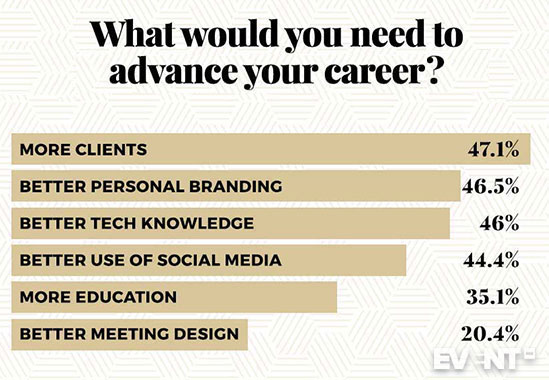Skift Take
Are you wondering what other event planners are earning and how your event planner salary stacks up?
We investigate whether your earnings in the event industry are likely to increase in 2019 and analyze the job market to reveal what opportunities are out there for you.
Let’s be honest, most of us don’t work in this frenzied career solely for the money. Many of us enjoy creating amazing worlds, the thrill of the organization or the planning, and meeting new people in exciting venues, the chance to travel, and make an impact.
But let’s face it…
The money pays the bills.
We have researched to find out the ACTUAL event planner salary payscale and job opportunities, compared to industry guidance, so you can see how your pay packet compares.
Intrigued?
Read on
You Should Be
Earning More This Year

In 2020, we updated our information with data from large hiring sites and a report. You’ll find updated salary numbers and a couple of extra bonuses, including the most in-demand skills based on the top 50 current job listings in each job title. We’ve also included a section on event salaries for titles other than “event planner.”
Let’s get started. First the good news (and don’t worry, it’s all good):
Comparing the data from what we found in March of 2019 and what we researched in December (2019) and January 2020, event planning salaries are on the rise and have grown considerably in the past year.
What makes you relevant in 2020? We reviewed 350 event planning job postings to find the skills needed to succeed. Download the free report.
How Much Do Event Planners REALLY Earn in 2020?

Updated Event Planning Salaries for 2020:
RESEARCH
$66,000 is the average event planner salary in New York City, USA (December 2019), a decrease of 12.8%.
£33,997 is the average salary for event planners in London, UK (December 2019), an increase of 18.11%.
Since our data collection in January of 2019, salary trends have varied depending on geography. In March of 2019, the research we conducted revealed that the average event planner in New York City earned $75,659, and in London, the average planner made £28,7842.
Brand New Research into Actual Event Planner Salaries in the US and UK
Having analyzed a total sample of 100 job postings in December 2019, we found some interesting information about the current market and the most desired skills of those hiring event profs.
As location plays a large role in salaries we’ve broken it down to look at the US and UK separately, using New York and London as a baseline. We also broke down the search based on title and experience to give a much more accurate view of the event industry profession.
For accuracy, we discounted the job postings that had no salary listed. For job postings that listed a salary range, we used the average of the low and high salary.
An Analysis of 50 US Job Postings
For the US, after analyzing 50 job vacancies for event planner listed for New York, we calculated the average event planner salary in NYC at $66,000.
An Analysis of 50 UK Job Postings
For London, of the 50 job postings that listed a specific salary, we identified that £33,997 ($44,672.06 USD) was the average salary for event planning jobs in London.
It’s All In The Name: How A Title Can Boost Your Event Salary
If you’ve ever shopped in a grocery store you know that the same product can be priced very differently based on its name. The same is true when it comes to jobs. The term “coordinator,” for instance, often denotes someone who is less experienced than a “manager.” However, it is possible in the event world to have very little difference between the skills of a manager and a planner, a coordinator and a specialist.
Yet there is usually a difference in their salary.
If you want a higher salary, consider the following data we uncovered after analyzing 50 positions in each of these titles across the US:
| Title | Avg. Salary (3 years)* | Years of Exp. | Avg Bonus |
| Event Coordinator | $15.83/hr | 1-3 | Not Listed |
| Event Manager | $49,090 | 3+ years | $5,000 |
| Event Specialist | $13.83/hr | Less than 1 year | Not Listed |
| Director of Events | $66,347 | 5+ | Not Listed |
*This average is given by Indeed.com as the average over the positions on the site over the past three years.
In lieu of a bonus, some jobs offer profit sharing or a commission. When calculating salary it’s important to understand what you’re eligible for and it’s paid out to you. The average for each of these positions is listed below:
| Title | Profit Sharing (in $)* | Commission (in $)* |
| Event Coordinator | 1,513 | 4,951 |
| Event Manager | 2,980 | 8,030 |
| Event Specialist | 2,600 | 6,000 |
| Director of Events | 4,750 | 9,583 |
And in the UK:
| Title | Avg. Salary (3 years exp)* | Commission* | Profit Sharing* | Avg Bonus* |
| Event Coordinator | £20,853 | £750 | £300 | £994 |
| Event Manager | £26,403 | £4,793 | £1,100 | £1,890 |
| Event Specialist | £29,500 | Not Applicable | Not Applicable | £2,750 |
| Director of Events | £45,836 | Not Applicable | £3,100 | £7,000 |
*This average is given by Payscale.com.
Mastering the Most In-Demand Skills in the Event Industry
Before you arbitrarily switch titles to be eligible for a higher pay grade, it’s important to know what employers are looking for in each position. Take the time to research and read other job descriptions with similar titles and not just the one you are applying for.
We have some research to get you started.
After analyzing 50 current job descriptions under each title, we found a lot of similarities. The following list details the top in-demand skills for each position.
EVENT COORDINATOR
An event coordinator is a junior title that often handles smaller tasks under a planner or a manager. However, if you’re a lone wolf in this position, meaning you’re the only one handling everything, a title change to manager may be more appropriate.
Top skills:
- Accurate and detail-oriented
- Excellent written and communication skills
- Familiarity with technology, particularly event platforms and social media
- Strong customer service and interpersonal skills
- Ability to collaborate within and across teams
- Display tact and maturity
- Ability to manage data and track events, particularly for budgetary and ROI purposes
EVENT SPECIALIST
Sometimes referred to as an event specialist and sometimes as an event marketing specialist, this position is less of a general coordinator and more of a specific professional. Often there’s an aspect of the event that they excel in like marketing or working as a liaison for a particular department or type of stakeholder.
Top skills:
- Self-motivation
- Results-driven
- Ability to present information effectively
- Ability to collaborate effectively
- Excellent written and oral communication skills
- Ability and willingness to work weekends and evenings
- Ability to stand for 8-10 hours
- Excellent follow-up
EVENT MANAGER
An event manager usually manages the process and a team, although that team could be a team of vendors. You can also be a manager by just managing process and not people. Either way, the title “manager” denotes more advanced decision-making powers and authority.
Top skills:
- Ability to manage projects successfully from inception to conclusion
- Management of team members and staff more generally across the organization
- Ability to collaborate within and across teams
- Familiarity with technology, especially event technology and social media
- Ability to collect, manage, interpret and present data in a digestible way, especially for budgetary and ROI purposes
- Ability to manage budgets and other financials
- Extraordinary negotiation skills
- Be self-motivated
- Above average written and oral communication skills
- Stellar customer service skills
DIRECTOR OF EVENTS
The director of events oversees all aspects of events and that usually means a team of event planners. Generally, this position is more of an overseer and handles less of the daily coordination and management of individual events. In a corporate setting, the work tightly with marketing to achieve the company’s business goals through events.
Top skills:
- Excellent interpersonal skills and ability to successfully collaborate within and across teams
- Ability to manage budgets and track/impact revenue
- Excellent communication skills
- Ability to sell/successfully promote a product or organization
- Familiarity with technology, especially events technology and social media
- Ability to manage, interpret and present data in a digestible way, especially for budgetary and ROI purposes
- Ability to manage a diverse team
- Tact and poise, especially when under pressure
- Strong customer service skills
- Vast experience managing events or venues
What You Can Expect to Earn as an Event Planner: Wider Research

There are a lot of figures thrown out there in terms of what you can expect to earn in the event industry but the guidance from different sources doesn’t always seem to tally up or is already out of date.
We decided to investigate what different reputable sources put forward as the average salary and compare it to our own research based on the job listings, experience requirements and details that are currently being advertised.
How Much Event Planners Make In The US
Glassdoor used 635 anonymous submissions of current event planner salaries to estimate that the average for New York has risen slightly from $61,195 in January of 2019 to $62,481 in December of 2019, an increase of about 2%.
Indeed used 76 employees, users, and past and present job advertisements on the site in the past 36 months that the average senior event manager (3-5 years of experience) makes $69,836 a year and, using a sample size of 1,582, an event manager with 1-3 years experience made $49,090 (December 2019). In comparison, our analysis of 50 job posts on the site at the time of this writing showed an average salary offering for someone with 1-3 years experience around $.
Payscale reported that the average event planner in the US made $48,030.
The Convene Salary Survey 2018 showed that nearly three quarters of event organizers received a raise from 2017-18, and the average salary increase was 7.22%.. But the report also found that the average hours worked for the salary was 46 hours a week, with 22%of event planners clocking in more than 50 hours a week.
For US professionals with 1-3 years of experience, the average pay is $52,986 (a slight decrease from 2018); with 4–5 years it grows to $65,042; 6–8 years averages $66,802; 9–10 years is $75,156; and 10-plus years, $94,2844.
As you can see, experience makes a big difference in salary and wherever possible, we used the lowest level of 1-3 years as the benchmark. If that is not the case, it was noted in this article.
Still, there is a large difference in findings across the industry in terms of the current average salary for jobs very recently advertised. But what the overall numbers show as we compared research from early 2019-20 was that earnings are moderately increasing for many.
How Much Event Planners Make In The UK
The salary estimate from Glassdoor for a UK event coordinator in the London area, based on 107 anonymous submitted salaries, is £25,470.
Indeed uses a larger data pool of 520 salaries compiled over the last 36 months to estimate an average of £25,278
Payscale estimated that the average salary in the UK is £20,853 with the average bonus being around £994.
The average calculated between these three sources is £23,867 per annum, which is about £3,900 off of our own research.
But what about positions outside of “event planner.” How do their salaries measure up?
Event Planner as a Job: Worth Fighting for?

What else did we find out about event planners? Take a look:
Event Planners Love Their Job
Passion is essential in event planning. Passion for the industry was evident in our results. In Convene’s annual salary survey, most event planners (70%) expressed satisfaction with their careers, and 50% were happy with their compensation.
Eventprof Salaries Are Rising
Comparing the data from what we found in early 2019 and what we researched in December 2019, event planning salaries are trending differently depending on geography and title. For example, though our own survey of job postings in the NY area shows a slight decrease in salaries for event planners, the Convene Salary Report estimated that growth to be around 7.22%.
So now that you know what you should be making, are you making that?
If not, don’t worry. We have a ton of tips for you on how you can increase those earnings in the short term and the long.
First here are the best ways our event profs thought to improve their salary and career:
Consider Personal Branding as the 🔑 Tool to Grow your Salary
Almost half (47%) of those surveyed said having more clients would help them advance their event planning career. Almost equally important were better personal branding (47%), better technical knowledge (46%) and better use of social media (44%).

In addition to the ideas in the graphic above, we have some tried and true tips for increasing your salary.
Want a better Event Planner Job? Try These 6 Tactics

Knowing the numbers is important, but that’s not the only thing that plays a role in the salary or job you get. Analyzing the job postings we found some useful information that may help you to grab a bigger salary role.
1 to 3 Years of Experience is Essential for an Event Planner Role
We found that:
- most of the positions for an event planner or event coordinator role specified 1 to 2 years’ experience is required
- event manager positions typically required 3+ years of experience
- none of them would accept less than a year of relevant experience
TIP
What this tells us is that if you have more than 3 years of experience in the event industry you probably need to be looking at jobs advertising different job titles and adjusting salary expectations accordingly.
Job roles such as event manager, special events manager, corporate event planner, fundraising manager and combined job titles often require many more years of experience and the salary should vary accordingly.
Make sure your event experience level meets the job spec:
- If you know you want a career in events the best advice is to start early gaining experience wherever you can, as soon as you can. If you are a student you need to get as much voluntary and paid work experience to bolster your CV. Even if you are not in a continuous or full-time event planning role you can learn a lot from one-off and short term projects.
- Gather evidence of all work experience. Take photos, list the experience you gained and ask for written confirmation from the event organizer so that you can start to build up your portfolio.
- Also list transferable skills such as office, admin, customer service and marketing experience you have gained. What is important to the employer is demonstrating that you have a proactive approach and have worked hard to get as much relevant and varied experience as possible. This is what will make you stand out over other candidates.
Even If Salary Details Are Not Disclosed, It Could Still Be Worth Your Consideration
In our research, we discounted those job postings that did not have specific salaries listed from our sample. These postings often gave a starting point or gave salary brackets instead. This does, however, illustrate that there is room for negotiation and that an employer is willing to tailor the final salary offer (within reason) to the candidate’s experience and salary expectations.
Recruiters are looking for the best event planners, not always the cheapest, so although every company will have a limit, there may be some flexibility to secure a bigger salary if you have the skills to back it up. The final salary amount offered in these situations is decided at, or following, the interview.
How to approach a job posting that is light on salary specific information:
- If a job role sounds interesting but insufficient salary information is given, make sure you ask the question before applying. There is no point in wasting your time and theirs if your expectations don’t align.
- Generally when looking at event planner jobs, be more wary of roles where your ideal salary is at the top end of the scale given. Chances are there is very little wiggle room in the budget and they are unlikely to give or exceed the top amount (no matter how good a negotiator you are). Often hiring organizations post salaries because they want everyone to know the budget. Again, don’t waste their time or yours if your desired salary is much higher than what they’re stating.
- Use your judgment. Really look at the specifications and get an idea of the salary region. For example, if you need to have at least one to two years experience you should be looking at the amounts discussed above. If they require over three years experience and you need to be supervising a team or specializing in a niche area then you should probably be expecting more remuneration.
Take a Pay Jump by Managing Others
A consistent finding across the job postings we looked at is that as soon as the job requirements mention a position of authority or seniority over other team members, it came with a spike in pay.
If you’re facing a pay level blockade and are unsure where to go next to raise your earning potential, the answer is definitely in growing your experience in leading others.
Take charge of others and reap the rewards:
- Stand out from your colleagues if you are looking for a bigger salary by showing yourself as a leader. That doesn’t always mean taking charge and telling people what to do, but also helping others and offering advice as an integral part of the team. This expertise will show you are ready to take on a more supervisory role and the pay jump that comes with it.
- While you should always try to get your own mentor to help guide you, also look to take someone starting out in the industry under your wing too. Show them the ropes and allow them to learn from you. You’ll get the small-scale experience of guiding others so you can hone your processes before going for a clear management role.
- If you know you are short on management experience, put yourself forward for volunteering opportunities that give you the chance to manage others. For instance, there might be the opportunity to oversee specific teams at the event, such as the registration team volunteers or those staffing the exhibition area or break out rooms. Start small and then look to manage more people as your confidence grows.
Improve Salary Through Switching Organizations
Some companies pay more than others and some event planning positions bring in more money because of the departments they are associated with. According to our findings, large companies with extensive corporate events pay on the higher end of the spectrum as do titles with marketing in them.
Event planners that fall into a sales or marketing department seem to command higher earnings than those that are in a standalone events department.
Increase Your Earnings in the Right Niche
Our analysis revealed that certain types of event planning positions command higher salaries. The highest out of those researched were for tech companies and those hosting international events, while universities and colleges seemed to pay close to the average.
An Event Planning Certification Isn’t Always Necessary
This is a bit of a double-edged sword because what we found is that only two job roles in our sample mentioned requiring a CMP or other event planning certification. The rest focused more on specific experience coupled with formal education.
The lesson here is that you shouldn’t let qualifications hold you back:
- If you have no formal education or qualifications it might be even more important to prove that you make the grade in other ways. Always track your career progress by documenting your achievements, particularly ROI and facts and figures that can be verified by others. This will strengthen your portfolio and show you know what you’re talking about, regardless of any official credentials.
- Consider event planning certification, online courses, and refreshers. An interesting medium could be short courses that keep your skills refreshed and learning up to date without the commitment and expense of going to event planner school and getting a qualification.
- Trade education for experience and try an apprenticeship instead so that you can gain both skills and learning at the same time.
While our job posting research didn’t place a high value on certification, to be fair, PCMA Convene’s 2019 Salary Survey found that respondents with a CMP earned (on average) $8,600 more annually than their colleagues without the certification.
Does certification affect your ability to get a job? Not according to current job openings. But it may give you a way to negotiate a higher salary.
Why You’re Not getting the Event Planner Job You Deserve and How to Change That
Are you already employed in an event planner job but are feeling financially unappreciated? If you feel like your salary doesn’t reflect the hours and effort you are putting in, you need to keep reading.
When it comes to your salary and earnings, there is no magic formula that can instantly make you more money, after all, your employer may be paying you the most they can viably afford, or if you are a freelance event planner or event agency your local clients could balk if you suddenly raise prices too high. But, most of the time, if you can PROVE it, you can negotiate a jump up, even if it’s incremental.
First, let’s look at some reasons you may be getting paid less than average. Not every event planner role is created equal.
The Main Factors Impacting Your Event Planner Earnings
- Event planner type. A wedding planning salary, for example, will differ from that of corporate planner. Your niche or area of expertise dictates, at least in part, your income potential.
- Your geographic area. Some areas command higher salaries, just as the cost of living is higher in some places. You should also consider that some areas have greater disposable income for regular events or higher budgets and this can be highly location dependent as well.
- Job title. Event planner, event manager, event associate? What you call yourself (or someone else calls you) dictates your job responsibilities or what others think you do, and affects your salary. Standard titles vary between countries but even between organizations there can be different terms used.
- Direct reports. Do you head up a team of event planners or mostly work alone, other than on event days? The more people you are responsible for and report to you on a regular basis, the more people you can expect to be paid. In a hierarchical organization, who you report to (n.b. how many levels are between you and the c-suite or end decision maker) can also make a difference in your pay scale.
- Experience and education. Experience and education help prove competency and thus can give you reason to command a higher salary. In some markets, having an event planner degree of relevant event planning certifications will enable you to earn more.
Highly successful people in the events field have a few key characteristics.
6 Steps to Control Your Own Destiny and Work Toward the Event Planning Salary You Want
You shouldn’t feel like you can’t control your salary now or in the future and there are plenty of things you can do to make sure you are getting the best you can!
Calculate the True Value of Your Current Position
Sometimes the best way to decide whether your salary is in line is to start seeing it differently. Does your job offer you more flexibility than other 9 to 5 jobs can expect? Do you get perks such as expenses being covered by the business or a free gym membership? Are you eligible for an end-of-year bonus or additional pay related to performance? Do you have unlimited vacation opportunities? Calculating your salary through monetary assignment of these benefits may help you realize you’re closer to the numbers you were hoping for than you originally thought.
It’s not just about the money – get the best deal for you:
- Calculate the worth of things like employment perks and benefits, time off, flexibility and bonuses. Add these to your current salary, if you receive them. Keep in mind that some bonuses and commissions are automatic (you get them every year assuming you do what you’re supposed to), while others are designed to reward extraordinary accomplishments. Never count on a bonus like the latter in your total compensation. If you’re not sure if you should count it or not, look at your earning history. What percentage of that bonus do you receive every year? Take an average, if necessary.
- Create your own bonus. Work with your clients or boss to discuss potential rewards you would be eligible for it you blew their expectations out of the water (like doubling paid attendance or securing 20 extra paid exhibition booths).
- Negotiate on things that are easier to bestow than salary. Sometimes budgets are tight. If they won’t move on what they pay you, they may be able to compensate you in other ways to make up for the deficit between what you are making and what you believe you should be making. Examples of this could include allowing you to keep venue loyalty upgrades or rewards for your own personal use.
Create An Actionable Career Plan
Honestly, you might not be in the right phase of your career to warrant a rise in salary, no matter how much you want it. Whether it’s a lack of experience, managerial skills, or even something like the time you can commit to your job role at the moment, you might not be in a strong position to raise your earning potential right now.
That doesn’t mean you should sit back and relax. You may not see a jump in numbers now but you can still impact your salary for the future by creating a career plan that keeps you focused and utilizing every opportunity you can.
Define your future income potential:
- Reflect and write down where you see yourself in five years. The salary, the job role, the experience, the city in which you operate, everything you need to get to your dream job looking five years into the future.
- Create a step-by-step plan for how to get where you want to be. What small steps and milestones do you need to reach and when in order to meet your goal? This might be gaining high-profile event experience, developing your portfolio, undertaking extra training, zeroing in on a niche, and/or developing your personal brand.
- Evaluate your current job role. Does it facilitate career progression and development for the future or are the opportunities limited? If there is wiggle room, speak to your boss about your aspirations. Perhaps they can put you in line for advancement if something comes up. They won’t always know to do this if you don’t let them know your ambitions.
Negotiate the Deal You Want
Don’t be afraid to talk about money because it’s all in how you ask. Exude confidence and professionalism and know when there is space for negotiation, and when there isn’t. A great negotiator can find the compromises (even when there seemingly isn’t any) and doesn’t push things too far they get taken off the table.
Event planners often have to negotiate better deals with venues and suppliers so by demonstrating that you are competent to discuss money and forge a mutually agreeable a deal when negotiating your own salary package shows valuable skills that your potential employer should recognize.
Smart negotiations for a better deal:
- Be specific. When it comes to numbers, specific figures create a realistic vision and are easily relatable, appearing as though you have given a lot of thought (which you should) into the number you are asking for. For example, ask for $55,850 instead of $55,000 because the assumption is it’s more realistic and you haven’t plucked the number from the sky, instead you’re backed by research.
- Understand the pay structure and level of responsibilities in the roles above you. If you ask for an increase that’s higher than what the person above you makes, you likely won’t receive it.
- Accept transitional rises. The reality is, you could be completely right in your salary expectations but the company simply can’t pay it, particularly if the salary you are negotiating for is a lot higher than your current one. Take the small wins and instead ask for incremental increases that are sustainable for the company and still improve your situation and self-worth. Small progress is better than none and getting recognition of an increase is better than nothing.
- Prove your worth, tying your efforts to the end results. Take hard facts and evidence into your discussions with management, such as new business secured as a result of your efforts, ROI achieved for events and sponsorship amounts you have managed to secure. Proving your personal value and contribution is a lot easier if you have tangible facts.
Diversify Your Income Potential
If a pay increase is out of the question in your current situation, look at how you could supplement it or get savvier. If your employment contract allows it you may be able to take on additional paid event planning projects or consultation on your own time that would increase your income or secure paid speaking engagements for a cash boost.
Or perhaps you can take steps now to get more money coming into the business which will make a pay rise more viable in the future.
Work with what you’ve got:
- Whether you work for yourself or someone else, stop giving advice out for free. While it can be nice to help, don’t give away all your trade secrets for nothing in return. Your experience is valuable! If someone asks to ‘pick your brain’, take the lead by countering with something like, “Fantastic. I’m glad to hear you’re interested in learning more about my event planning process. The next step is my personal consultation where I can learn more about your event and we can talk about event planning options. The charge for my 30-minute session is $________. I also have an hour session for $_________ that comes with a list of ideal venues (or some other value add). Which one works best for you?”
- Create tiered packages. Create different pricing levels for your event planning packages that focus on service and experience rather than the planning itself. For example, the biggest package could include your unlimited consultation or input while the lowest package simple has an introductory session. A decent event planner package will look similar to another so offer something different, yourself!
- Do your research. You may have experience in event planning but have you ever managed or consulted before? Make sure you know exactly what you’re offering is in line with their expectations so they’ll keep coming back again and again.
Know Your Worth
If you feel that you are at a dead end and your chances of getting a pay rise or progressing within the company are slim then it could be the time to start finding another position in the industry. If you know your worth and can prove the value you bring to your employer but your salary expectations cannot be met then perhaps it is time to shop around for a better deal.
Often the only way to vastly increase your salary is to go elsewhere. Many employers are capped within a range and can only offer incremental increases. That’s fine if you’re close to what you want to be making but not ideal if you discover you’re making $20,000 under market value. If you are, speak up and present the data.
Likewise, if you are involved in securing new business, don’t be afraid to say no and walk away if they can’t pay the fee you are proposing. Whenever you lower your prices drastically in order to land your next client, you just cheapen your services overall (why should your next client pay more if your previous client paid less) and this is not enhancing the chances of a pay rise in the future.
Clever offerings to increase profitability:
- Set up job alerts for your keywords and geographical area to get an idea of what roles are out there and what they are asking for. If you don’t meet the criteria it can illustrate the areas of your CV that need to be strengthened. Even if you are not looking to make a move immediately it can be a fruitful process.
- Try volunteering in a new industry or gaining experience in a different role and write a guest post or start a blog. By taking steps to broaden your reach and network you can help to establish yourself as an expert in the industry, which may pay off for your career in the future so that you can command the bigger salaries.
- Be proactive in addressing the company pricing structure and identifying ways to bring in new business or increasing profitability. This shows a proactive approach and the type of employee that all businesses want. As a guide, you want to be generating significantly more value or income for your employer than is needed to cover your salary and employment costs.
- Network with other event professionals and share tactics and strategies. If you’re plugged into the network, you’re more likely to hear about opportunities before they become open to the public. That gives you a jump on the competition. Another bonus in showing interest early lies in negotiating a higher salary. Often if a company can hire quickly without having to incur recruiting or other large expenses, they may have more room in the budget for salary.
Boost Your Skills
A lack of skills or experience in the event industry could be stopping you from getting the higher paid roles you’re looking for. From management positions in an event team to high-profile special events, it’s all about proving you can handle it and showing your skills to justify the salary.
Prove yourself:
- Book an out of hours training course or qualification that you can do alongside your current role to boost your skills and show commitment. This event planning training guide can help you to make informed decisions about course, certificate, certifications, and degrees. Think about how you can apply this learning to improve processes in your current role.
- Learn from others. Your colleagues can have a lot of value and getting yourself in position for a higher salary means using all of your resources. Work closely with someone with seniority in your team to understand what it takes from them to get paid what they do. This will also help you during negotiations because you have a better idea of what your specific company requires for each pay bracket.
- Start small. You can find yourself way out of your depth if you go from small party planning to large conference all on your own, instead build up to bigger events by seeing the opportunity to develop your skills at each event. When you are ready, ask your boss if you can head the team for the next event you organize, giving you supervising and management experience.
15 Honest Truths Why You’re Not Earning the Event Planner Salary You Want (and What to Do About It)
Still feel like you’re doing everything possible and it’s just not working?
You could be making one (or more) of these mistakes and it is hindering you from realizing your financial potential.
If you aren’t measuring up, it’s time to look at some honest truths as to why this could be:
You Work for Someone Else
You have very little say about your salary when you work for someone else. Your raises will likely be limited to a few percentage increases each year. You can work your tail feathers off and your salary will still be in a conservative range. The real money is in event planning entrepreneurship where working harder will show with the number of clients and the value of the contracts you bring in. Plus, when established you can set your own prices, hopefully getting into a position to give yourself a raise whenever you see fit.
We are, under no circumstances, encouraging you to immediately quit your event-planning job to set up your own event-planning company or suggesting that this is a quick or easy solution. This is a decision that needs deep thought and careful planning. It takes many years of hard graft before most people dream of seeing any profit and more likely than not you will be paying yourself a pittance in the meantime. Also, many fledgling businesses don’t even last more than three years. The rewards can definitely be achieved but only with a lot of risk and sacrifice and heartache to get there.
This is definitely not a quick win but could be your best long term strategy. Nothing is guaranteed but putting it simply:
Working for someone else means you are working towards the success of their business. What they pay you must always be in the interest of their organizational growth. On your own, you are limited only by your own creativity and hustle.
But…
All the risk is yours as well.
Are you cut out to start your own business? Think it through:
- List the pros and cons of setting up your own business or working for someone else. Be brutally honest.
- Talk to others in the industry that have set up their own business to understand the enormity and realities of starting out on your own.
- If you want to go out on your own, create a business plan and start to develop your client base and projects part-time/on the side whilst you still have a guaranteed pay packet.
- Determined it is the right step for you to take? If so, follow the detailed guidance on how to start an event planning business from home. Written with first-hand experience, it covers the steps you need to take to establish your new event management company.
You Don’t Look and Act The Part
Positioning yourself to take in top dollar requires branding as much as it does the right client. If you don’t look the part and don’t handle the details the way high-end planners do, you’ll fail to command those higher fees. Everything about you personally should say professional, and not economy. If you can secure top clients paying top dollar for your company you have a stronger case to ask for a pay rise. Actions speak louder than words.
But…
Looks aren’t the only components behind a high-end event planner brand. You want to tie-in your marketing with your beliefs. This means doing more thought leadership pieces, standing behind a cause, and letting your actions speak louder than words.
Make the right impression, consistently:
- Invest in a few high-end wardrobe pieces and accessories. Even though you are a creative and your style might not be tied to power business suits you still want your clients to know you have made an effort.
- Remember that everything you post on social media or write on a blog is in the public domain. Keep your accounts private or ensure that anything you post you would be happy for your boss or future employer to see.
- Brainstorm where your marketing efforts are likely to pay off and will be consumed by your ideal client.
You Don’t Have the Portfolio
While the details behind event planning aren’t all visual, your client and boss think they are. They want to see the parties/events you’ve hosted. A lackluster portfolio won’t help you bring in the revenue and new clients your company needs and therefore not result in the high salary offer you’re hoping for. Give them what they want in visual form, and they’ll be more likely to write a large check. And this isn’t just limited to images, this could be through video footage, social media activity, and reporting.
Likewise gathering a strong portfolio is the best way to sell yourself to a new potential boss at an interview. Get them excited about your achievements and what you could do for their organization.
Build your portfolio:
- Shoot images of your work even if you have to stage them. Invest in a photographer to capture your event projects in all of their glory – even though you will be busy dealing with the bigger picture.
- Create an online portfolio of your work and share the URL with your network.
- Have an active social media presence and keep your professional profiles up to date.
You’re Lacking References
Someone may take a chance on an unknown event planner if the salary is low, but no one wants to gamble on an expensive planner without awesome references.
So…
Think carefully about those that will give you a glowing reference. Most employers expect two references to be supplied.
Get someone to vouch for you:
- Always ask permission before using anyone as a reference. If you are not giving your most recent employer(s) explain why this is.
- It is worthwhile developing testimonials from numerous different projects to strengthen the assurances you can give to a new boss. Start with one client. Provide excellent service. Ask them for a referral or a testimonial. Getting testimonials on your LinkedIn profile is a great and public way to show your value.
- If you can’t decide on which two references to supply, give more than you have been asked for. This will only strengthen your appealability.
You Haven’t Priced Yourself Appropriately
There are only 24-hours in a day. You can only work about ¾ of them on a consistent basis without being hospitalized for exhaustion. That means if you’re not charging appropriately, you’ll never make what you want to earn – whether this is your salary expectation or whether you work for yourself and are setting your own fees.
Charge what the market, your experience, and your expertise can bear. Don’t be afraid to charge what you’re worth. When you’re branding is spot-on with what you’re asking, someone will pay it.
Many consumers also believe they get what they pay for. They will have a hard time believing you service a luxury audience on bottom basement pricing. If you want to make more, charge more but ensure you don’t do it in a vacuum. You’ll need to rebrand yourself as an upscale event planner and that takes more than just rates (see #2).
Reconsider pricing:
- Research pricing for event planning in your area and specialty. Make a few calls or ask other planners in your social media groups. Decide whether package pricing helps you make more money than an event planner salary per hour. Make the switch to an event planner hourly rate, if that’s the case.
- As discussed earlier in the post, investigate the job availability and salary in your area and calculate what the market rate is for your job role so you know if you should be seeking a pay increase from your boss
- Negotiate better rates with other vendors so your costs drop but keep the hourly charge the same for your clients.
You Don’t Have Any Upsells
Assuming your event planning fees are at the high end of what you can ask and fetch, the next step to increase business revenue (and therefore increase earning potential) is to create upsell opportunities. This could mean consultations for non-clients or markups for managing it all (as in creating a one-stop shop for everything for your client). Get creative with upsells because it’s easier to upsell an existing client than find a brand new one.
Create your own upsells:
- If you work for someone else, create new ideas around pricing and request a meeting to discuss your ideas.
- Work out consulting fees to plan but not coordinate events. This is even something you can do alongside your day job if you are not in competition with the company your work for (e.g. if you are employed as an event planner, perhaps you could get paid to act as a wedding planner in your own time?)
- Work out management fees to manage the day-of-event details without the planning. Sometimes people don’t have the money for both and these services only take a few hours.
- Create an all-inclusive package where you handle everything. Price this accordingly because there’s a lot of work involved but some people don’t want to worry about anything and will pay it.
You’re Not Making Money When You’re Not Working
If you look at millionaire event planners, most of them eventually offer something on the side. This allows them to get off of the limiting salary treadmill of exchanging hours for money.
Want to know their secret?
They create opportunities for themselves to make money when they are not working. Examples of this include books, online courses or certifications, and retail product lines.
While a product line with a well-known department store may not be on the cards right now, creating and self-publishing an ebook is very doable. Even if it only makes $30 a month, that’s money you’re not actively working for.
Invest the time upfront and create a valuable item. Offer it on your website or other online marketplace and make money while you’re busy doing other things. This could also open the doors for speaking engagements, teaching classes, and hosting trainings.
Create passive income generators:
- Write an ebook on how to create an extraordinary event in minutes a day or on a budget. Find an angle that people will pay for, self-publish and charge for it.
- Create a course to help other event planners learn from your experience.
- Create a membership community with such valuable resources that people will pay a nominal monthly fee to be a part of it.
You’re Not Asking for It
If you work for someone else, you may need to ask for a raise in order to see the salary you’re hoping for. If you’re not investing time and effort in professional development and you’re not tracking your worth to your company, you need to start doing that immediately. After you have those figures in place and you’re able to show through data what you’re worth, you should approach your employer for a raise, bringing you more in line with what you’d like to make.
Don’t forget…
the company you work for needs to be making good profits from the work you do before it can think about raising your salary. If what you’d like to make is much higher than what you currently make (as in more than 25%), you may be better off looking for other opportunities. It is extremely difficult for an employer to increase your salary by that large of a percentage unless you landed the event planning behind the Super Bowl.
Make the first move:
- Research the event planner payscale at your company.
- Chart your worth and what you’ve brought to the table since working there (i.e., clients, vendor partnerships, etc.).
- Show how you have saved the company money through negotiations or other cost-cutting measures. Share these three things with your boss and ask for the pay rise you believe is due to you.
You Don’t Know What Event Planners Make
I’d like to make what an NFL player does for the hours he works but that’s simply not likely in the career I’ve chosen. If you are unhappy with your salary, make sure you’ve done your homework (such as by reading this post!) and know what people in the industry make.
There is nothing wrong with comparing yourself with the Preston Bailey or Colin Cowies of the world but… these celebrity event planners are the exception, not the norm. If you want to make what they do you’re not looking at being an event planner, you’re looking to create an event planning empire. Those are different undertakings.
Do your research:
- Again, research the event planner payscale at your company and in your area. Compare apples to apples. Learn about what event planners make in your area, in your niche, with your level of experience.
- Ask successful event planners (and other successful people you know) how they became successful and look for ways you can implement their suggestions in your life.
- Evaluate what is most important to you. Do you want to work in event planning above all else, even if there is a ceiling to your earning potential, or is money more important than anything else, even if that means shifting to a completely different career path?
You Have Nothing to Offer
If you want to command an extremely high salary in event planning, you have to offer something others don’t. Most people won’t cough up a huge payment without a reason.
Maybe you’re an expert in a particular industry, niche or solution, or maybe you handle last-minute events like no one else can. You need a market differentiator or rock star luck to command top dollar.
Which will it be?
Increase your value:
- Figure out what you do that few others do.
- Make sure it’s something clients would pay extra for.
- Begin marketing this unique value proposition to your current/future boss and clients that are willing to pay for it.
Your Marketing Isn’t Speaking to Your Ideal Client
Your marketing must be targeted to your ideal client. If it doesn’t resonate with them, it will be difficult for you to bring in top salary. Take some time to personalize your approach to bring in more ideal clients. For example, if your company specializes in business conferences your marketing needs to be attractive to the corporate market – it needs to use the right language, tone, imagery and objectives for those you are looking to attract.
Compare the tone of a McDonald’s commercial versus that of a luxury car brand. Even if you closed your eyes and didn’t understand the language, you could tell the luxury brand from the fast food option.
It’s important to know…
Marketing a high-end event planning business is evident in all of your marketing collaterals including your website, how people answer the phone at your office, and your office decor. If you’re looking for a higher salary, you need to look at every aspect of how you present yourself and that begins with your marketing.
Know your ideal client:
- Adopt a high-end tone in your marketing. Not sure what that is or how to do it? Look at luxury brands and listen to their words and look at their design. Find ways to incorporate those things into your marketing. For instance, words like “exquisite” aren’t used in cheap products.
- Consider beefing up your branding as well. Don’t limit that work to just your logo but stationery, an e-signature, company social media profiles, and anywhere else your branding touches. Rebrand your website and your marketing align with the image and messaging you want to portray. Test it in the design stages to find out what others think.
- Consult help from a designer or wordsmith to ensure your marketing speaks to the higher end event planner salary you hope to earn.
You’re In the Wrong Industry
Some niches within event planning pay very well. Others, not so much. If you’ve leveled out in your industry, you either need to enter another one by broadening your market or offer additional services and upsells.
If you decide to expand into another market or niche, make sure you do your research and know everything you can about the niche. Niche marketing only works when that niche feels like you are speaking to them. General marketing with a few choice keywords is not niche marketing.
If you work for an event-planning company and see another opportunity outside of your current market, do your research and present the opportunities. That’s another way to prove your value, which can increase your salary.
Figure out what you want:
- Research your new market or niche. Quora is a good place to learn about what your demographic is asking about.
- Perform keyword searches to find out how your market is looking for you and the services you offer.
- Learn the vernacular of your new market. Read their association journal or join Facebook or LinkedIn groups to learn more about them.
You’re in the Wrong Community
Large city event planners make more than small town ones (generally) so don’t be tempted to compare your salary with that of an event planner to the stars living in Manhattan. According to US News & World Report in 2017, the highest paying communities for event planners were:
1. Nashua, New Hampshire (average earnings $76,400)
2. San Jose, California ($76,010)
3. San Francisco, California ($72,120)
4. Framingham, Massachusetts ($70,920)
5. Kennewick, Washington ($69,790)
That has changed quite a bit since 2015. That year the highest were:
1. Coeur d’Alene, Idaho
2. Bridgeport, Connecticut
3. Napa, California
4. Hartford, Connecticut
5. San Francisco, California
Of 2015’s data only San Francisco remains on the top 5 list.
If you aren’t satisfied with your income, compare the event planner salary in California to the event planner salary in Maine. If you can work anywhere and you want to follow the higher salaries, do so but know that they will change. It’s also important to understand that often those higher salaries usually come with high living costs as well.
According to US News & World Report, the highest paying states for meeting, convention, and event planners are:
- District of Columbia
- New York
- New Jersey
- Alaska
- Connecticut
It’s about where you are:
- Learn what the average event planner makes in your area.
- Move to an area where event planners have higher salaries.
- Start marketing your services in other areas or make it clear you’re willing to travel to those spots.
You’re Comparing Yourself
If you’re basing your salary on others you could be setting yourself up for disappointment. Unless you have exactly the same job role, do the same work and offer the same value then you can’t compare yourself, even to your colleagues.
Their situations may afford different benefits in other ways or they provide extra value you don’t know about, for example, your colleague may do overtime, work extra or out of hours or take on tasks for other departments to justify their salary.
Focus on you:
- Never base a negotiation on someone else’s situation because you’ll be doomed to fail from the beginning as you may not have all the facts.
- Understand that “celebrity” or “high profile” events can sometimes be about WHO you know, not WHAT you know so comparing your credentials is not going to help you justify their kind of salaries because clients and customers don’t always have that kind of budget, there is a threshold.
- Don’t allow comparisons against other members of your team to hold you back. Just because someone has been at the company longer doesn’t mean they are the best person for the new role or pay rise, it’s all about what YOU offer so focus on that. You’re not out of the running automatically.
You Don’t Have What Employers Are Looking For
If you want to command top dollar working for someone else, you need to have the qualifications they are looking for and you need to market those qualifications on your resume. It does you no good to have the skills of you aren’t listing them or you’re unable to prove them to a potential employer.
In our 2019 analysis of the event planning job market, we noticed the top skills employers were looking for in event planner positions were excellent:
- Customer service skills
- Written and oral communication skills
- Computer acumen
- Ability to establish and maintain positive working relationships
- Ability to work cooperatively
Most employers also mentioned the necessity to be able to work in a fast-paced environment. Most of these skills seem basic to event planners. However, while applicants may think to mention them in interviews, one has to be selected for an interview first. That’s why you must ensure the hiring entity knows you possess these skills.
Land that interview by:
- Giving solid examples of how you fit the skills they’re looking for.
- Exceeding expectations. If they ask for the ability to work in a fast-paced environment, for instance, give them numbers or better yet a video compilation of your workday.
- Using the words they do in their job description throughout your resume and cover letter and also adding popular skills from other event planner job postings. The latter idea will help you attract corporate recruiters as well.
IN CONCLUSION
Most event planners love what they do. If they didn’t, the long hours and pressure simply wouldn’t be worth it! At the same time, it is only fair that you are compensated for all of the energy and effort you put in. If your event planner earnings are falling short we hope that the actionable tips in this post will propel you to the income potential you deserve and that you are in a stronger position to command the salary you have always dreamed of.
Now onto you:
- Do you have a tip to make this page better? Send an email to [email protected].
- Do you want to use any of the statistics in this post? Apply here
- Do you have more tips and advice to add about how to increase your income working in the event industry? What tips paid off for you? Comment below.
- Do you have a colleague who may benefit from reading this page? Share it with them.








